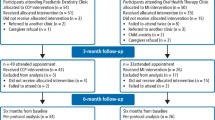Abstract
Design In total, 15 secondary schools were designated to one of three groups: (I) prevailing health education (PHE); (II) motivational interviewing (MI); and (III) MI with interactive dental caries risk assessment (MI + RA). Adolescents (n = 512) with negative oral health patterns (irregular tooth brushing and/or regular snacking) were recruited from groups I-III; 161, 163 and 188, respectively. Selected candidates received interventions corresponding to their assigned group. Participants completed a questionnaire on their oral health self-efficacy and routines at 0, 6 and 12 months. Dental caries (number of decayed surfaces/teeth status) and oral hygiene (dental plaque score) of the participants was also recorded at these intervals.
Case selection The 15 secondary schools were recruited from the three main districts in Hong Kong. Those included in the study were required to be full-time students in a participating school, 12 or 13 years old, not have any major systemic disease, able to communicate in Cantonese or Mandarin and have unfavourable oral health behaviour - this was defined as brushing teeth less than twice a day and/or snacking more than twice a day.
Data analysis The Statistical Package for Social Sciences was used for data processing. For the lost to follow-up cases, the intention-to-treat analyses were performed using the carry forward imputation (for example, the latest known outcome). The Kruskal-Wallis test was used to compare the medians through nonparametric methods. The distribution was compared using the chi-square test. Where the outcome was continuous, a linear mixed model was constructed (for example, plaque score and dental caries). Where the outcome was dichotomous, mixed-effects logistic regression was constructed (for example, 1) changes in oral health self-efficacy - remain negative versus change to positive; and 2) changes of oral health behaviours - remain unfavourable versus changed to favourable). Sociodemographic variables (for example, parental education and sex) were controlled for.
Results Participants in groups II and III were more likely to increase tooth brushing frequency and reduce their snacking after 12 months, compared to group I. In addition to this, groups II and III had a lower number of new carious teeth compared to group I.
Conclusions PHE was less effective than MI in evoking favourable changes in the oral health patterns of adolescents and preventing dental caries.
This is a preview of subscription content, access via your institution
Access options
Subscribe to this journal
Receive 4 print issues and online access
$259.00 per year
only $64.75 per issue
Buy this article
- Purchase on Springer Link
- Instant access to full article PDF
Prices may be subject to local taxes which are calculated during checkout
Similar content being viewed by others
Change history
25 March 2022
A Correction to this paper has been published: https://doi.org/10.1038/s41432-022-0234-2
References
Watt R G. Social determinants of oral health inequalities: implications for action. Community Dent Oral Epidemiol 2012; DOI: 10.1111/j.1600-0528.2012.00719.x.
American Academy of Paediatric Dentistry. Adolescent oral health care. The Reference Manual of Paediatric Dentistry. 2020. Available at https://www.aapd.org/globalassets/media/policies_guidelines/bp_adoleshealth.pdf (accessed November 2021).
Wu L, Lo E C M, McGrath C, Wong M C M, Ho S M Y, Gao X. Motivational interviewing for caries prevention in adolescents: a randomized controlled trial. Clin Oral Investig 2021; DOI: 10.1007/s00784 021 04037-w.
Weinstein P, Harrison R, Benton T. Motivating mothers to prevent caries: confirming the beneficial effect of counselling. J Am Dent Assoc 2006; 137: 789-793.
Torday J S, Baluška F. Why control an experiment?: From empiricism, via consciousness, toward Implicate Order. EMBO Rep 2019; DOI: 10.15252/embr.201949110.
Author information
Authors and Affiliations
Rights and permissions
About this article
Cite this article
Hawrot, H. Does motivational interviewing promote oral health in adolescents?. Evid Based Dent 22, 134–135 (2021). https://doi.org/10.1038/s41432-021-0219-6
Received:
Accepted:
Published:
Issue Date:
DOI: https://doi.org/10.1038/s41432-021-0219-6
This article is cited by
-
Oral health of adolescents in West Africa: prioritizing its social determinants
Global Health Research and Policy (2023)



